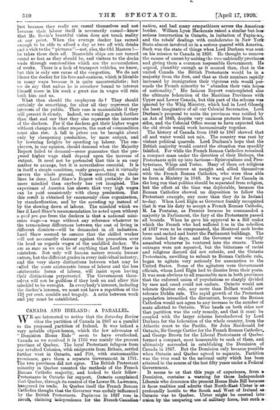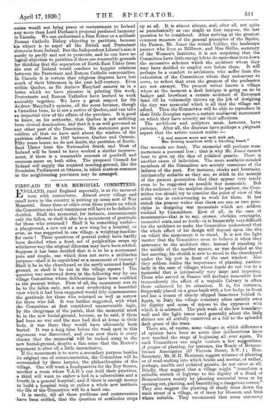CANADA AND IRELAND : A PARALLEL.
WE are interested. to notice that the Saturday Review cites the partition of Canada in 1867 as a parallel to the proposed Partition of Ireland. It was indeed a very notable object-lesson, which the few advocates of " Dominion Home Rule " seem to have overlooked. Canada as we received it in 1763 was mainly the present province of Quebec. The loyal Protestant refugees from our revolted Colonies, with emigrants from Britain, settled further west -in Ontario, and Pitt, with statesmanlike presciene,e, gave them a separate Government in 1791. The two provinces did not agree. The British Protestant minority in Quebec resented the methods of the French Raman Catholic majority, and looked to their Maw. rrotestants in. Ontario for support. Ontario complained that Quebec, through its control of the Lower St. Lawrence, hampered its trade. In Quebec itself the French Roman Catholics thought that the Governor was unduly influenced by the British Protestants. Papineaa in 1837 rose in revolt, claiming independence for the French-Canadian nation, and had' many sympathizers across the American border. William: Lyon Mackenzie raised a similar but lea serious insurrection -in Ontario, in imitation of Papineau,. and the rebels' dealings with confederates in New York State almost involved us in a serious quarrel with America. Such was the state' of things when Lord Durham was, sent., on his mission to Canada in 1838. He thought to remove. the causes of unrest by uniting the two unfriendly provinces and giving them a common responsible Government. He argued, plausibly enough as it seemed then, that in the- united Canada the British Protestants would be in a majority from the first, and that as their numbers rapidly increased by immigration their vigorous rule would per the French minority to " abandon their vain hopes, of nationality." His famous Report' contemplated also the ultimate federation of the Maritime Provinces with Upper and Lower Canada, but this part of the scheme was i s "red by the Whig Ministry, which had in Lord Glemeig t i e least imaginative of all our Colonial Secretaries. Lo Durham's proposal to unite the provinces was ratified by an Act- of 1840, despite very ominous protests from both sides, and the Colonial' Office seems to have expected that the old rivals would work harmoniously together. The history of Canada from 1840 to 1867 showed that oil and water would not mix. The country was rent by violent political quarrels. Lord Durham's hope that the British majority would control the situation was speedily falsified. For while the French Roman Catholics remained a compact masa under the direction of their Bishops, the Protestants split up into factions—Episcopalians and Pres- byterians, Whigs and Tories. Many of them set religious and racial differences at naught and allied themselves- - with the French Roman Catholics, who were thus able. to form a Ministry in 1848. It was good for Canada in the long run that politics should be separated from religion, but the effect at the time was deplorable, because the. Roman Catholics showed no disposition to follow the Protestant example, any more than they do. in Ireland. to-day. When Lord Elgin as Governor frankly recognized that it was his duty to accept a French Roman Catholic, M. La Fontaine, as Premier because he commanded a majority in Parliament, the fury of the Protestants passed all bounds. When he gave his approval to a Bill under which the French who had suffered loss in the rebellion of 1837 were to be compensated, the Montreal mob broke loose and sacked and burnt the Parliament buildings. The riots lasted for days, and the- Governor was violently assaulted whenever he ventured into the streets. These outrages were not repeated, but the bitterness of racial and religious discord did not subside, and the Ontario Protestants, unwilling to submit to Roman Catholic rule, began to agitate very seriously' for annexation to the United States. Some of the agitators were Government officials, whom Lord Elgin had to dismiss from their posts. It was soon obvious to all reasonable men in both provinces that the enforced union of populations so sharply divided by race and creed could not endure. Ontario would not tolerate Quebec rule, any more than Belfast would now tolerate Dublin rule. The rapid growth of the Protestant population intensified the discontent, because the Roman Catholics would not agree to any increase in the number of seats allotted to Ontario. Wise heads on both sides saw that partition was the only remedy, and that it must be coupled with the larger schenie foreshadowed by Lord Durham for the federation of the whole country, from the, Atlantic coast to the Pacific. Sir John Macdonald for Ontario, Sir George Cartier for the French Roman Catholics, and George Brown for the Liberal Protestants of Quebec formed a compact, most honourable to each of them, and, ultimately succeeded in establishing the Dominion of Canada in 1867. But the Dominion only became. possible when Ontario and Quebec agreed to separate. Partition was the' true road to the national unity which has been attained in the course of the last fifty years under a Federal Government.
It seems to us that this page of experience, from a Dominion, contains a warning for those Independent Liberals who denounce the present Home. Rule Bill because it faces realities and admits that North-East Ulster is as profoundly hostile to' the South arid. West of Ireland as. Ontario- was to Quebec. Ulster might be coerced into union by the unsparing use. of -military force,- but suck a union --would not bring peace or contentment to Ireland any more than Lord Durham's proposal produced harmony in Canada. We can understand a Sinn Feiner or a militant Roman Catholic Bishop objecting to partition, because his object is to expel all the British and Protestant elements from Ireland. But the Independent Liberal's aim is surely- to pacify and not to persecute, and he can have no logical objection to partition if there-are reasonable grounds for thinking that the separation of North-East Ulster from the rest of Ireland would conduce to happier relations between the Protestant and Roman Catholic communities. In Canada it is certain that religious disputes have lost much of their bitterness in the past half-century. Even within Quebec, as Sir Andrew alacphail assures us in a letter which we have pleasure in printing this week, Protestants and Roman Catholics have learned to work amicably together. We have a great respect for Sir Andrew ;Macphail's opinion, all the more because, though a Canadian born, he is not a native of Quebec, and can take an impartial view of the affairs of the province. It is good to know, on his authority, that Quebec is not suffering from clerical domination, and that it is as well governed-as any other part of the Dominion. His statement goes -to confirm all that we have -said about 'the wisdom of the partition -effected in 1867 between Quebec and Ontario. Fifty years hence, we do not doubt, the •partition of North- East Ulster from the Nationalist South and West -of Ireland will be found to have worked a similar improve- ment, if there is a reasonable amount of goodwill and common-sense on both sides. The proposed Council for Ireland will supply the required meeting-ground, like the Dominion Parliament at Ottawa, in which matters common to the neighbouring provinces may be arranged.



































 Previous page
Previous page